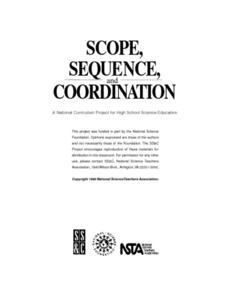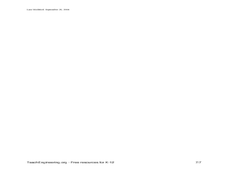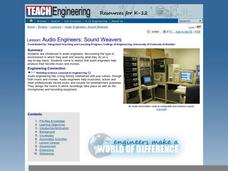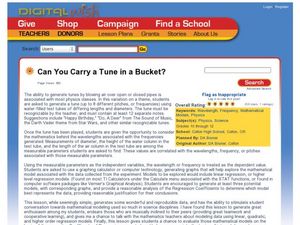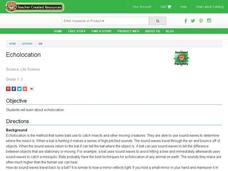Scholastic
Study Jams! Sound
Listen in as Mia and Sam expound on sound. It is caused by vibrations and travels in waves. It has the qualities of pitch, frequency, and volume. This hip animation displays a graph to depict the frequency and amplitude of sound waves....
Curated OER
Listening Devices
Students design and construct a listening device that will allow them to listen to the sound generated by specific object inside a box.
Curated OER
Hooke's Law, Vibrations, Mechanical Waves, and Sound
Dangle a spring to experiment with vibration and discover if period is dependent on amplitude. Strum a guitar and adjust the strings to compare displacement and sound. Use a Slinky® and guitar strings on a ring stand to uncover the...
Curated OER
Playing With Science
Young scientists investigate the scientific concepts and principles that help make common toys such as hula hoops, yo-yos, slinkies, and silly putty work. As a class, they read "Backyard Rocket Science, Served Wet" to get a look behind...
Curated OER
Sounds Like Great Science!
A phenomenal lesson on sound is here for your third graders! In it, learners engage in hands-on activities, watch video, take part in Internet activities, and complete tasks in cooperative groups in order to explore the world of sound...
Curated OER
Seeing and Feeling Sound Vibrations
Groups rotate through a series of stations and work with a partner to observe sound waves. Children describe sound in terms of pitch, volume, and frequency. To apply their new knowledge, the class considers how these observations can...
Curated OER
Waves
Light waves and sound waves are the focus of this science lesson designed for 5th graders. Besides discovering how these waves travel, learners also discover the basic properties of waves, and analyze data tables and graphs. The...
Curated OER
Sounds like Science
Second graders create sound effects to produce a radio drama. In this sound lesson, 2nd graders read a book and provide the sound effects to transform it into a radio drama. They discuss sound and the shape of sound waves based on their...
Curated OER
Telecommunication: Sound Waves
Some interesting diagrams here will pique your students' interest as they discover what is actually inside the telephone that they use every day! The frequency and amplitude labels then lead to further details about sound and waves of...
Curated OER
Standing Waves and Music: Suggested Demonstrations
There are four embedded links in this brief resource that take you to handouts or worksheets that assist young musicians in understanding standing sound waves. They'll play their instruments to show and then discuss different sound waves.
Curated OER
Plumbing the Deep-Using Sound Waves to See
Young scholars explore and learn about the concept of echolocation. In this echolocation lesson, students explore how animals and engineers use echolocation (seeing under water) and sound waves to look and hear things under the deep water.
Curated OER
Audio Engineers: Sound Weavers
Learners explore audio engineering. In this career education and "sound" science lesson, students define related vocabulary and make connections between the music they listen to and the job an audio engineer does after listening to...
Curated OER
Sound
Third graders explore sound. They describe sounds in terms of their properties and explain how sounds are made. Students discuss how various sounds sound to their ears and how sound travels in waves.
Curated OER
Sound Waves
Using a karaoke machine, a guitar, and other devices, learners explore the way sound waves travel. Using this hands on approach, learners can get a better understanding of wavelength, frequency, and more.
Curated OER
The Physics of Sound: How We Produce Sounds
First graders construct a KWL chart on sound. For this physics lesson, 1st graders describe different ways to produce sound. They explain how sound waves propagate.
Curated OER
Sound Waves
Students explore sound. In this "sound" science lesson, students define sound and explain how sound travels. Students experiment with paper cups and string to conclude how sound travels. Students research a chosen aspect of sound with a...
Curated OER
Woodwind Instruments and Pitch
Students explore musical pitch. In this cross curriculum musical instruments and "sound" physics lesson, students identify and describe common traits of woodwind instruments. Students research "pitch" and what causes pitch fluctuation by...
Curated OER
The Phenomenon of Sound: Waves
Students explore sound waves. In this sound waves lesson, students brainstorm different sounds and how sounds move or travel. Students then create a KWL chart and work through six different lab activities to examine how sound waves...
Curated OER
Name That Tune
Young scholars complete a fingerprint oil lab in order to simulate how geologists use the oil and natural gas in rocks to hear sound waves that signify there are oil in those rocks. In this rocks lesson plan, students learn that the rock...
Curated OER
Can You Carry a Tune in a Bucket?
Learners use water filled pipes to play a tune and consider the mathematics behind the sound waves. In this sound wave lesson, students play a tune with water filled pipes. They create a mathematical model to evaluate the wavelengths and...
Curated OER
Echolocation
Young scholars explore echolocation. In this bats science lesson, students compare sunlight reflecting off a mirror to sound waves hitting a bat's ears. Young scholars complete a worksheet about bats.
Curated OER
Rhythm and Art: Gesture Drawing
Students explore connections between non-verbal language and art. In this visual and auditory art lesson, students investigate the science of sound and principles of drawing. They then use various genres of music to directly apply that...
Curated OER
Building Polymer Cup Speakers
Students investigate sound waves and they build audio speakers. In this audio speakers and sound lesson, students explore how to make quality audio speakers. As a team they build their own speakers to have clarity in sound, quality in...
Curated OER
Directing Sound Waves
Students learn that sound waves can be directed and collected. In this sound wave experiment, students create and collect sound waves. Students learn sound waves travel differently through different states of matter.




